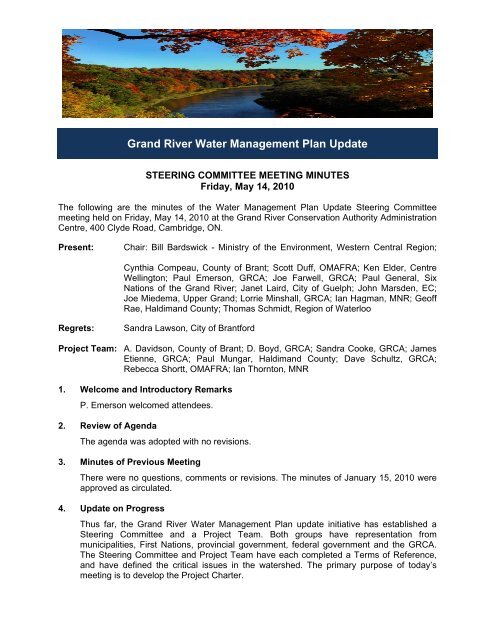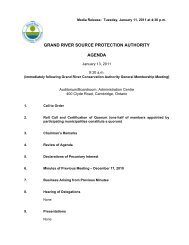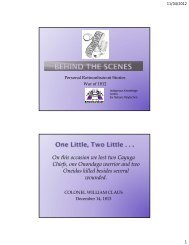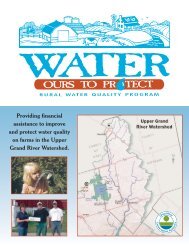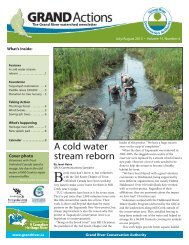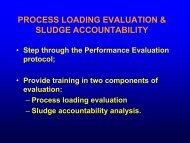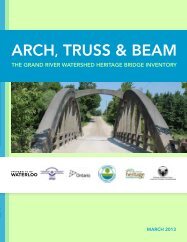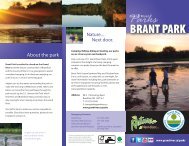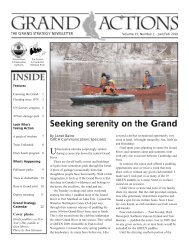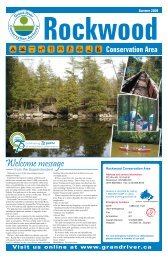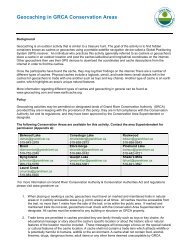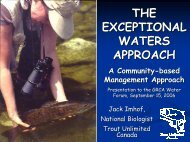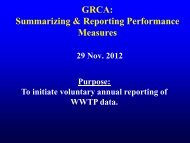May 14, 2010 - Grand River Conservation Authority
May 14, 2010 - Grand River Conservation Authority
May 14, 2010 - Grand River Conservation Authority
You also want an ePaper? Increase the reach of your titles
YUMPU automatically turns print PDFs into web optimized ePapers that Google loves.
<strong>Grand</strong> <strong>River</strong> Water Management Plan Update<br />
STEERING COMMITTEE MEETING MINUTES<br />
Friday, <strong>May</strong> <strong>14</strong>, <strong>2010</strong><br />
The following are the minutes of the Water Management Plan Update Steering Committee<br />
meeting held on Friday, <strong>May</strong> <strong>14</strong>, <strong>2010</strong> at the <strong>Grand</strong> <strong>River</strong> <strong>Conservation</strong> <strong>Authority</strong> Administration<br />
Centre, 400 Clyde Road, Cambridge, ON.<br />
Present:<br />
Chair: Bill Bardswick - Ministry of the Environment, Western Central Region;<br />
Cynthia Compeau, County of Brant; Scott Duff, OMAFRA; Ken Elder, Centre<br />
Wellington; Paul Emerson, GRCA; Joe Farwell, GRCA; Paul General, Six<br />
Nations of the <strong>Grand</strong> <strong>River</strong>; Janet Laird, City of Guelph; John Marsden, EC;<br />
Joe Miedema, Upper <strong>Grand</strong>; Lorrie Minshall, GRCA; Ian Hagman, MNR; Geoff<br />
Rae, Haldimand County; Thomas Schmidt, Region of Waterloo<br />
Regrets:<br />
Sandra Lawson, City of Brantford<br />
Project Team: A. Davidson, County of Brant; D. Boyd, GRCA; Sandra Cooke, GRCA; James<br />
Etienne, GRCA; Paul Mungar, Haldimand County; Dave Schultz, GRCA;<br />
Rebecca Shortt, OMAFRA; Ian Thornton, MNR<br />
1. Welcome and Introductory Remarks<br />
P. Emerson welcomed attendees.<br />
2. Review of Agenda<br />
The agenda was adopted with no revisions.<br />
3. Minutes of Previous Meeting<br />
There were no questions, comments or revisions. The minutes of January 15, <strong>2010</strong> were<br />
approved as circulated.<br />
4. Update on Progress<br />
Thus far, the <strong>Grand</strong> <strong>River</strong> Water Management Plan update initiative has established a<br />
Steering Committee and a Project Team. Both groups have representation from<br />
municipalities, First Nations, provincial government, federal government and the GRCA.<br />
The Steering Committee and Project Team have each completed a Terms of Reference,<br />
and have defined the critical issues in the watershed. The primary purpose of today’s<br />
meeting is to develop the Project Charter.
Minutes of Meeting<br />
GRWMP Update: Steering Committee<br />
<strong>May</strong> <strong>14</strong>, <strong>2010</strong> Page 2<br />
L. Minshall has been appointed as the full time coordinator for the Water Management Plan<br />
update. Lorrie has been with GRCA for over 30 years, most recently as Director of Source<br />
Protection Planning.<br />
5. Project Team Terms of Reference<br />
The Project Team met on March 25 to establish their Terms of Reference and commence a<br />
draft Project Charter.<br />
The mandate of the Project Team is the coordination, development and management of the<br />
Water Management Plan update project. The Roles and Responsibilities, Meeting<br />
Procedures and Governance Structure of the Project Team were reviewed.<br />
It was suggested and agreed upon that the Steering Committee roles, responsibilities and<br />
mandate should be removed from the Project Team Terms of Reference.<br />
Socio-economic considerations such as recreation and tourism from the various components<br />
of the Watershed Management Plan will need to be integrated with the Water Management<br />
Plan outputs.<br />
It will be important to seek feedback from more groups than those represented by the<br />
Steering Committee and Project Team. The communications strategy will identify how to<br />
connect the various stakeholders to this process.<br />
The working groups will require a clear scope to ensure they are focused on the goals of the<br />
plan. It will be the responsibility of the Project Team to ensure the working groups have the<br />
appropriate focus. There will be cross-over between some of the working groups, mutual<br />
members in some groups, and a communications member on each of the working groups.<br />
It was suggested that the Communications Working Group be amended to Communications<br />
and Engagement Working Group.<br />
6. Project Charter<br />
Goals, Objectives and Performance Measures<br />
Goals #6 was added to the goals since the last meeting. Reducing flood damage and flood<br />
risk potential was previously captured under the climate change goal, but has since been<br />
shown as a separate goal.<br />
Goal #1: Improve Water Quality<br />
There was concern with the term "nutrient budget" if the assessment of nutrients will be<br />
based on relative proportion; relative proportion is not the basis of a nutrient budget, as<br />
defined in the agricultural community. Different wording will be considered for "nutrient<br />
budget".
Minutes of Meeting<br />
GRWMP Update: Steering Committee<br />
<strong>May</strong> <strong>14</strong>, <strong>2010</strong> Page 3<br />
Goal #2: Understand/Enhance/Deal with Assimilative Capacity<br />
The wastewater master plans will require review to determine if the planned upgrades can<br />
meet the water quality objectives. Point source and non-point sources reductions will both<br />
need to be assessed to determine their effects. Reviewing the wastewater master plans in<br />
isolation is unlikely to improve the wastewater going into the rivers, as there are non-point<br />
sources and seasonal considerations as well. Combining considerations for non-point source<br />
reductions and the wastewater master plans may provide a more balanced perspective.<br />
It was noted that an identification of costs would assist in setting priorities to ensure benefits<br />
are maximized (i.e. costs of non-point source improvements versus point source upgrades).<br />
There was consensus that considerations of cost should be included in the charter, and<br />
linked to the schedule.<br />
The water quality and assimilative capacity objectives and deliverables will also be linked in<br />
the charter for clarity.<br />
Goal #3: Secure Water Supplies<br />
Water demand management objectives are difficult to do on watershed scale. Each<br />
municipality's water supplies are very different, and the financial implications on the<br />
municipalities could be immense. It was agreed that demand management objectives can be<br />
an assembled set of strategies, with each municipality determining their own strategy.<br />
The Water Management Plan is strongly linked to Source Protection Planning. The technical<br />
leads for Source Protection are also participating in the Water Management Plan update.<br />
The Water Management Plan will need to address water conflicts, but the outputs will be<br />
locally developed and cannot be addressed before 2012.<br />
Goal #4: Lake Erie Objectives<br />
There was concern that the goal to "Act at the watershed level to achieve Bi-National<br />
objectives for Lake Erie" implies that this plan is assuming and committing to the<br />
responsibility to achieve the Lake Erie targets. It was clarified that the Lake Erie LaMP will<br />
have established targets and objectives for the <strong>Grand</strong> <strong>River</strong>. These targets will be integrated<br />
with the river targets. The Project Team and Working Groups will advise what we are able to<br />
achieve and establish practical targets.<br />
It was suggested that check boxes be added to the charter to identify whether the goals and<br />
objectives are a "plan" item or a "do" item.<br />
Goal #5: Build resiliency for Climate Change<br />
There were no questions or comments.<br />
Goal #5: Reduce Flood Damage Potential<br />
There were no questions or comments.
Minutes of Meeting<br />
GRWMP Update: Steering Committee<br />
<strong>May</strong> <strong>14</strong>, <strong>2010</strong> Page 4<br />
"In" and "Out" of Scope Items<br />
Current “in” and “out” of scope items were reviewed, noting the list is incomplete and<br />
requires further feedback. The focus should be on items that can be completed in 18 months<br />
or less and that can be funded. It was noted that including the Certificates of Approval in the<br />
"in" scope items has legal limitations.<br />
Municipalities would prefer if general practice targets were in scope for wastewater treatment<br />
plants, such as tertiary treatment, as opposed to specific performance targets, such as<br />
phosphorus outputs. There was caution that a study would not have sufficient weight or<br />
research to support a specific target. L. Minshall clarified that the premise is that any work<br />
required for municipalities will be put forward by the municipality; this is a joint action plan.<br />
From that perspective, we may only be able to go so far. The wording will be revised from<br />
"performance targets" to "performance objectives".<br />
It was suggested that costs would be a good “in” scope item.<br />
The Charter is a live document, and can be amended as we work through this process.<br />
Project Timelines<br />
Working groups will take various lengths of time to form. By September, it is hoped there will<br />
be a draft communication strategy. Stakeholder and the public engagement will be underway<br />
throughout the fall. Any funding for priority investigative work will be required by March 2011.<br />
The public process is implicit in the project timelines. The communications strategy will detail<br />
the public component of the timelines. There will be a Steering Committee meeting in late<br />
June at which time a framework for the communications strategy will be available for review.<br />
By September, the communications strategy should be fairly complete.<br />
In light of sensitivities with the rollout of this plan and a municipal election, the public<br />
meetings will be held after the October election.<br />
Project Costs and Funding Sources<br />
The Ministry of the Environment and the <strong>Grand</strong> <strong>River</strong> <strong>Conservation</strong> <strong>Authority</strong> are splitting the<br />
cost of a coordinator, and the GRCA has included an annual budget to provide support for<br />
the committees and working groups.<br />
It was noted that the GRCA staff will be able to do some of the work, but not the full breadth<br />
of the work. Any investigative studies are unfunded at this time. More detail and costs for<br />
investigative studies will become available as the working groups develop their work plans.<br />
When the time comes to look for funding for investigative studies, the Steering Committee<br />
will have to discuss prioritization.<br />
The governance structure will be amended to reflect the Assimilative Capacity with the Water<br />
Quality Working Group and to reflect the Climate Change feeding into all of the working<br />
groups.
Minutes of Meeting<br />
GRWMP Update: Steering Committee<br />
<strong>May</strong> <strong>14</strong>, <strong>2010</strong> Page 5<br />
Project Governance, Roles and Responsibilities<br />
The Water Management Plan will be a joint plan whereby each of the members reports back<br />
to their organization.<br />
Each group will need to determine how best to communicate with their organization. The<br />
Terms of Reference and the Charter can be presented, as well as the minutes. Some<br />
councils may want a presentation.<br />
Project Communications<br />
The name of the "annual report" will be changed to “progress report”.<br />
Project Stakeholders<br />
The draft communications and engagement framework will be available in June. It was<br />
suggested that the communications and engagement working group consider a stakeholder<br />
advisory committee; a representative group of stakeholders to bring in early with whom they<br />
can communicate.<br />
It was also determined that a set of key messages and a standard slide deck for introductory<br />
presentations should be established to ensure consistency.<br />
Project Risks, Critical Success Factors<br />
Any comments on the project risks and critical success factors should be provided to Lorrie<br />
Minshall.<br />
7. Early Actions<br />
Mark Anderson provided a presentation regarding a Watershed-wide Wastewater<br />
Optimization Pilot Project.<br />
8. Other Business<br />
None.<br />
9. Suggested Meeting Dates<br />
The next meeting is Tuesday, July 6, <strong>2010</strong> from 9:30 pm – 12:30 pm. Thomas Schmidt will<br />
chair the meeting.<br />
10. Wrap-up and Adjournment<br />
The meeting adjourned at 12:05 pm.
Minutes of Meeting<br />
GRWMP Update: Steering Committee<br />
<strong>May</strong> <strong>14</strong>, <strong>2010</strong> Page 6<br />
Action Items:<br />
1. Remove Steering Committee Roles, Responsibilities and<br />
L. Minshall<br />
Mandate from Project Team TOR.<br />
2. Amend Communications Working Group to Communications and L. Minshall<br />
Engagement Working Group.<br />
3. Revise wording for Nutrient Budget (Charter – Goal #1). L. Minshall<br />
4. Amend Charter to include cost estimates and connect estimates L. Minshall<br />
with the schedule.<br />
5. Link Water Quality and Assimilative Capacity L. Minshall<br />
6. Identify securing water supplies as an assembled set of<br />
L. Minshall<br />
strategies.<br />
7. Revise "performance targets" to "performance objectives" ("In" L. Minshall<br />
and "Out" of scope items).<br />
8. Add "Strategy to assess WWTP capabilities and performance" to L. Minshall<br />
"In" Scope.<br />
9. Public meetings to be held after the municipal election (October D. Schultz<br />
25).<br />
10. Amend governance structure to reflect Assimilative Capacity and L. Minshall<br />
Water Quality and to reflect Climate change integration into all of<br />
the working groups.<br />
11. Amend "annual report" to "progress report". L. Minshall<br />
12. As part of the communications and engagement plan develop a<br />
key set of messages and a standard slide deck for introductory<br />
presentations to ensure consistency.<br />
D. Schultz


